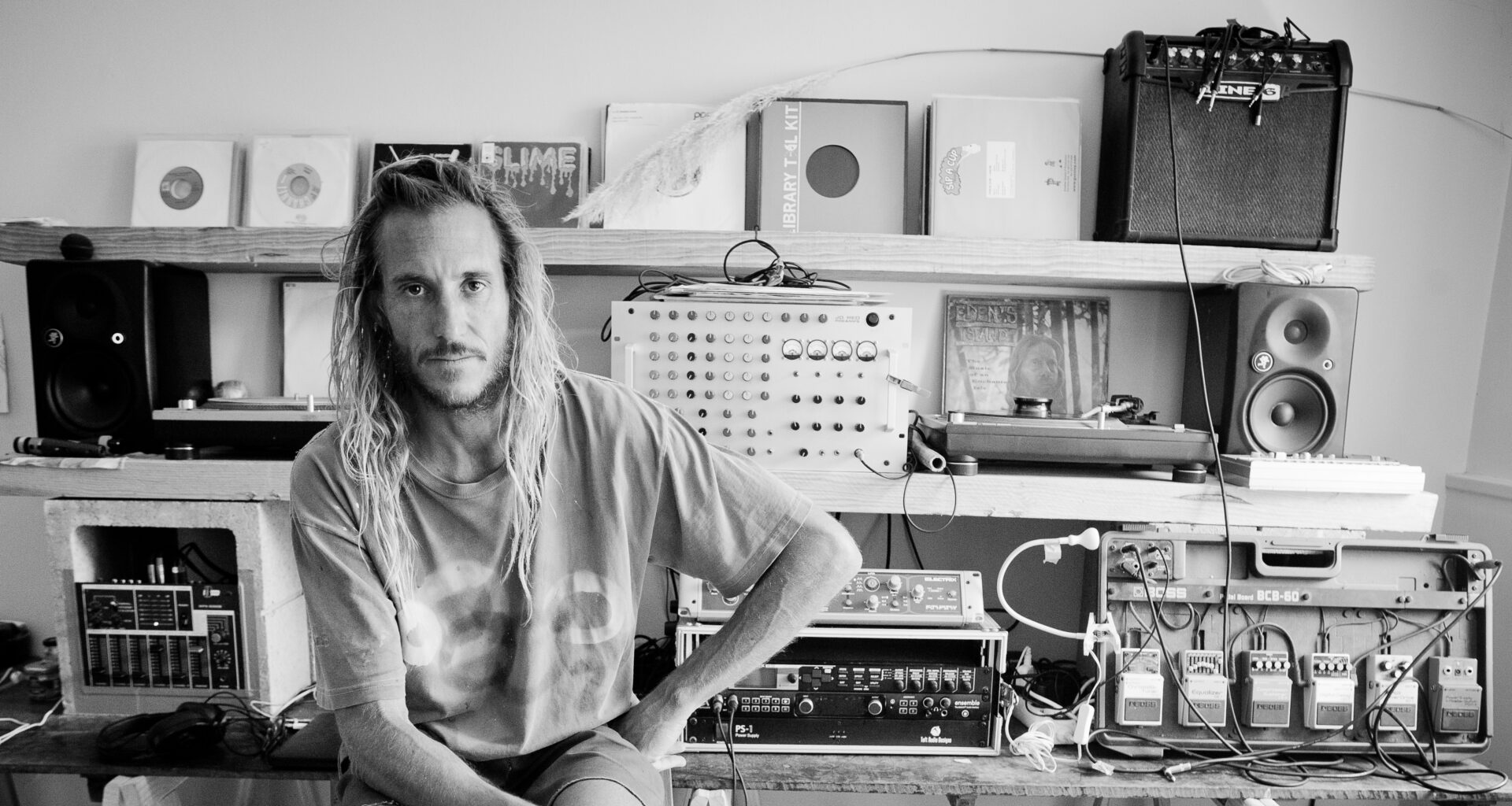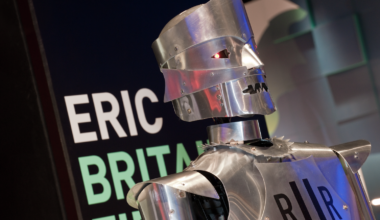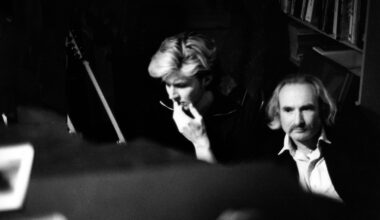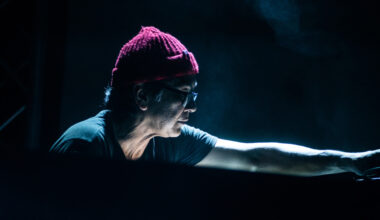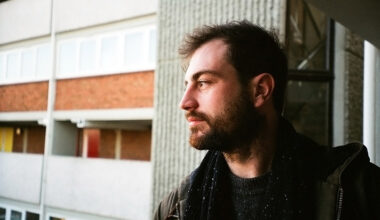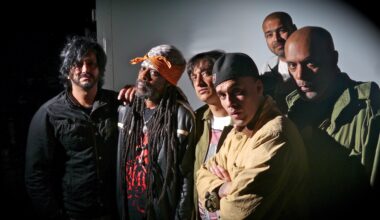Julian Smith began his Jane In Palma project after a cataclysmic event turned his life upside down in an instant. Six years and two albums on, he’s producing some of the most inventive electronica around
In the world of art, the seemingly opposing forces of creativity and destruction often have a closer relationship than you’d think.
The KLF deleted their back catalogue and then burned a million quid to regenerate themselves, while performance artist Michael Landy and his team of boiler-suited assistants systematically destroyed all of Landy’s possessions in the former C&A flagship store on London’s Oxford Street as part of his now legendary ‘Break Down’ art piece.
Fate sometimes plays a hand too, throwing a cataclysmic spanner into the works and forcing a drastic change of tack. Anyone who has made electronic music will know the propensity of equipment, both old and new, to suddenly malfunction and point the way to something unexpected and often original.
In the case of Julian Smith, the musician and visual artist behind Jane In Palma, his life was turned upside down by a devastating event totally beyond his control. It would shape his entire existence from that point on – in material, geographic and philosophical terms.
Speaking from his new home in southern France, a backdrop of vivid paintings and music technology behind him, Julian recalls the phone call from a friend telling him that the building where he’d stored his entire artistic output in Venice Beach, Los Angeles, was on fire.
“Someone didn’t put out their cigarette properly and the entire building – hundreds of units, millions of dollars, countless priceless memories – went up in flames. At least, that’s what the storage company told us. I went online in the middle of the night and watched the news helicopter cam survey the fire from above. I could see my friend was exactly right. My unit, with everything to my name, was at the epicentre of the fire. All gone, just like that.
“In that moment, a switch clicked… and it altered my life for the better. I knew I had the power to not let it affect me negatively, to appreciate what I still had and not wish for more. In other words, to hold tightly and let go lightly. So that’s what I did.”
Julian Smith cut his musical teeth in a string of Californian punk bands before moving into engineering and production. He also used his outstanding artistic skills to work as an advertising designer and art director for various surf, skate and fashion brands, including a high-powered stint with Levi’s. To some, it might have seemed he was in clover, but Julian had become increasingly dissatisfied by his daily grind. Specifically, the use of his talents to shift product and promote a system that was diametrically opposed to his own beliefs.
So, in the heart of the hectic concrete jungle of Los Angeles, he made probably the most drastic decision of his life. With the fire acting as a sort of cleanse, he chose to move away from commercial activities and focus his energy back into music and fine art.
“I realised that I had little connection to the advertising industry, either creatively or philosophically,” he notes. “I wasn’t in it for the dollars and I didn’t enjoy selling fleeting products to perpetuate the exact lifestyle I was trying to avoid.”
Which is how Julian found himself on a Balearic island in 2014, getting his Jane In Palma project underway. He’d been going to Palma in Majorca to visit a girlfriend there since 2010 and had been amazed by the health and happiness of its older inhabitants.
“I saw the fountain of youth in a cove,” he remembers. “Old people, in their 80s and 90s, swimming or whizzing by on their bicycles. In the end, it took me four years to move over there. And then when I did, my girlfriend and I broke up.”
Was she the “Jane” of Jane In Palma?
“No,” he laughs. “‘Jane in Palma’ was a contact name in my phone and I thought it had a ring to it.”
Julian used his debut Jane In Palma album, ‘Primitive Thoughts’, which came out in 2016, to explore the immediate fallout of his move to Majorca, his relationship break-up, and the subsequent culture shock of living in a simple finca so remote it didn’t even have an address. As well as recording the album, he threw himself into making colour-drenched abstract paintings as a way of achieving a “cathartic, visual expression of the experience”, noting that this was “the best way for me to deal with it”.
Julian’s second album, the recently released ‘Safety Net’, develops his thinking into concerns about the wider world and how people need to change almost from the inside out. Much of what he has done since that year zero fire, he says, has been in some way a direct reaction to his old corporate life.
After being a slave to what he calls the “formal resolve” way of working – having an idea and then acting on it – he’s moved to a more instinctive approach, letting inspiration and chance guide him, in both his musical and his visual enterprises.
“I never took the opportunity to explore the gestural and the abstract when I was in art school, or even when I was an art director. I’ve come to despise the idea of taking creativity and making capital out of it.”
‘Safety Net’ is a playful and diverse album, resonant and unexpected, spanning the twin worlds of Julian’s punk rock roots and the electronic and beats-based styles he grew into further down the line. Across the 18 tracks, he courses from the boiling, Devo-esque frustration of the title track and ‘Soft And Lazy’, via the dreamy textures and hip hop breaks of ‘P Liz’, to the mechanical drums, loopy tones and answerphone message samples of ‘Lizard Tempo Riddem’.
If there’s a common factor that runs throughout this rich, unpredictable smorgasbord, it’s Julian’s distinctive guitar sound, loaded with reverb and wonkily oscillating through severe flanger action.
“That’s me covering up the fact that I can’t play shit,” he laughs, although the evidence suggests otherwise. “I’m not well versed in anything. It’s just the expression that takes me there.”
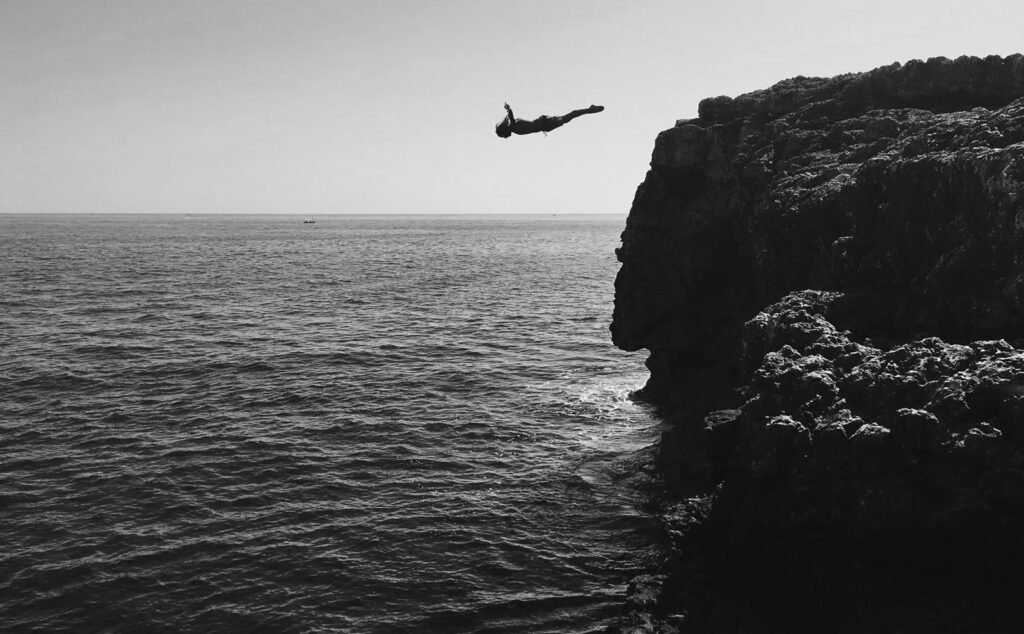
He adds that he grew up listening through his bedroom door to his big brother – some 16 years older, in fact – playing virtuoso guitar solos.
“He was always the first person I was trying to impress. When you have an older brother, they’re like the masters, you know? He was – and still is – an incredibly knowledgeable musician. When you hear Yngwie Malmsteen solos going down behind closed doors, you think, ‘OK, that’s the bar’… and you can never pass that bar.”
‘Safety Net’ is a playful and diverse album, resonant and unexpected, spanning the twin worlds of Julian’s punk rock roots and the electronic and beats-based styles he grew into further down the line. Across the 18 tracks, he courses from the boiling, Devo-esque frustration of the title track and ‘Soft And Lazy’, via the dreamy textures and hip hop breaks of ‘P Liz’, to the mechanical drums, loopy tones and answerphone message samples of ‘Lizard Tempo Riddem’.
If there’s a common factor that runs throughout this rich, unpredictable smorgasbord, it’s Julian’s distinctive guitar sound, loaded with reverb and wonkily oscillating through severe flanger action.
“That’s me covering up the fact that I can’t play shit,” he laughs, although the evidence suggests otherwise. “I’m not well versed in anything. It’s just the expression that takes me there.”
He adds that he grew up listening through his bedroom door to his big brother – some 16 years older, in fact – playing virtuoso guitar solos.
“He was always the first person I was trying to impress. When you have an older brother, they’re like the masters, you know? He was – and still is – an incredibly knowledgeable musician. When you hear Yngwie Malmsteen solos going down behind closed doors, you think, ‘OK, that’s the bar’… and you can never pass that bar.”
In time, Julian has come to embrace expression over technical proficiency.
“Style trumps technique,” he declares. “But when you have a bit of both and you combine them, and you have a lot of curiosity and inspiration… for me, that’s the magic. It’s why I’m really attracted to rhythmic music. It has fewer notes, but it comes from the very backbone of dance music. Since day one, we’ve congregated around a fire and banged drums.”
Do the tracks tend to evolve in specific patterns?
“Formulas don’t really apply. I do a sketch and then I resolve it in a certain way. If there’s a formula, then that becomes a repetition of craft, and that’s my doom. I need to surprise myself. When I do something and it comes out the exact opposite of what I set out to do, that’s when I know it’s a true expression of that moment.”
We discuss the popularity of the mistake – the huge cheer a DJ gets when the needle skips off a piece of vinyl and the whoops of delight when a tray of drinks is dropped in a bar.
“I want to see mistakes and I want to see vulnerability, to see a human aspect. If I don’t have that in my work, then there’s no point doing it.”
While it’s clear that a lot of time and effort has been poured into the making of ‘Safety Net’, its imperfections are as important as anything else contained within it. The recordings are raw and you get a similarly intimate feeling from listening to this as you might from the lo-fi efforts of Smog.
It’s unashamedly DIY, but is nonetheless filled with flashes of sonic perfection. Dusty drum machines and battered keyboards combine to make something more than the sum of their parts. Unlike so much electronic music, you certainly feel you know its creator better after hearing it. There’s a sense of connection, an illusion of being in the same room that more polished and removed productions simply bypass.
The album’s message is subtle, but the philosophy behind it is spelled out in the accompanying notes, which discuss a “quiet coup” we can undertake to disengage ourselves from some of humanity’s more toxic behaviours. There’s even a list of gentle suggestions, such as cutting out the middleman wherever possible, swerving the big chains when it comes to eating and drinking, walking or biking when you can, and eschewing phones and the internet in favour of true interaction.
“I had this really common itch,” says Julian, referring to the familiar feeling of disempowerment. “This is how I solved it. It’s about being the change you wish to see, rather than saying the change you wish to be.”
He’s quick to stress that it’s not his intention to point a finger or present a doctrine. It’s more a case of steering people in the right direction. It’s an extension of the punk ethos and the positive mental attitude that have stayed with him from his earliest days in music. It also reflects what he’s gleaned from the Rastafari movement, which he recognises as being concerned with many of the same issues and promoting individual transformation to enable wider social change.
In the world of Jane In Palma, the minutiae of personal life mirrors the world at large. After exploring and trying to understand the effects of withdrawing from his former existence, then with ‘Safety Net’ suggesting ways of fighting back, the project is set to evolve again. Following six years in Majorca, Julian has upped sticks – a mere two weeks before we caught up with him, in fact. He’s moved to Guéthary on the coast of south-western France, at least for now.
Aside from the lure of big waves to surf, this is a chance for him to “go legit”. Technically speaking, he’d been an illegal immigrant in Majorca. It’s a different situation in France, where the government is happy to offers visas to musicians and artists.
“Living the ghost life was very challenging. You’re always finding the back roads to places. When you get stopped for the little things, like traffic, your heart is pounding.”
Beyond that, the relocation also marks the end of Julian’s self-imposed artistic isolation. While his Majorca years have paid dividends, both in terms of productivity and spirituality, he has finally begun to crave the kind of artistic kinship that a small fishing port simply can’t offer.
“I’ve met some incredible people and I’m not discounting anything,” he says. “I spent so much time there and got so much energy from it, but I didn’t want to be some lone wolf. You just need to have an exchange with people, with a community.”
No one knows what will come next, least of all Julian Smith himself, which seems to be how he likes it. But whatever the next chapter brings, it will be well worth keeping an eye out for, and probably an ear or two.
“One thing I know – famous last words – is that I do instinctively feel I will go back to Majorca at some point. Probably sooner than later. It’s still very much home.”
‘Safety Net’ is available on Bandcamp
